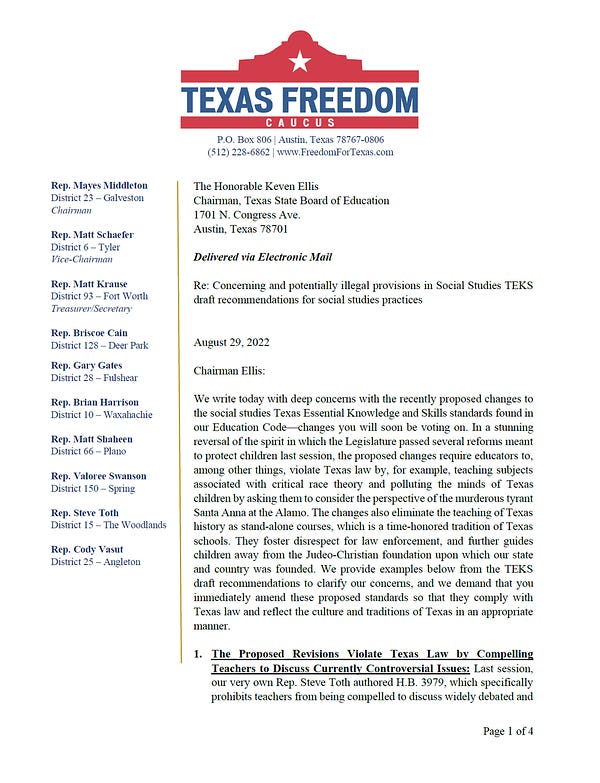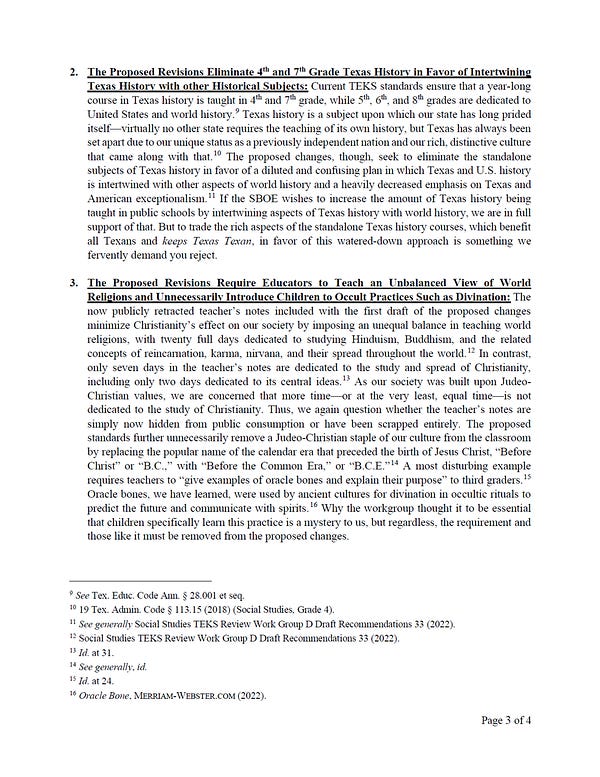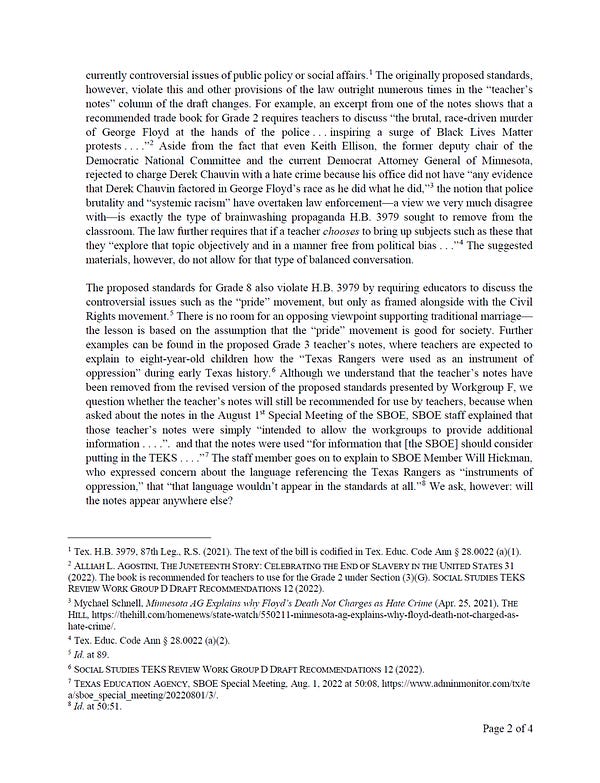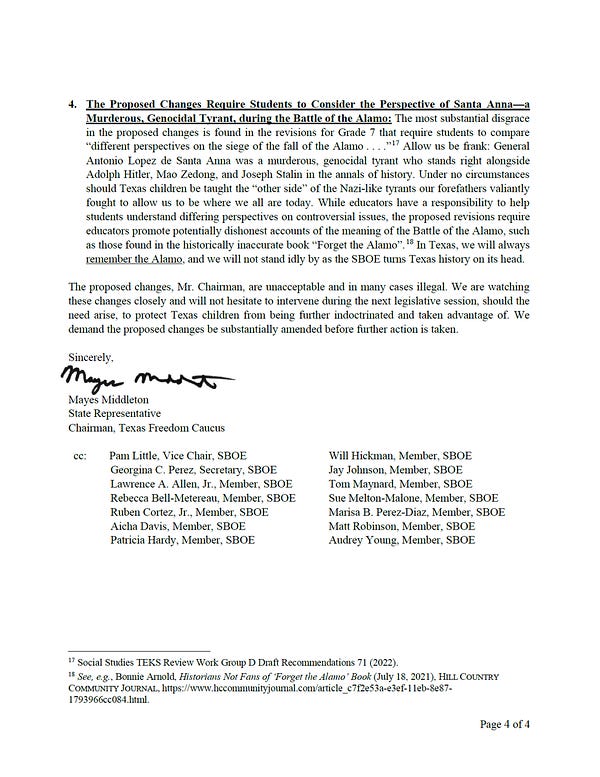Those who rewrite the past own the present
What Putin's invasion of Ukraine has to do with Texas social studies standards
My friends used to have a podcast called Taking Ship, which they billed as “a voyage through dumbest timeline America.” The title originated when these friends and I were drinking together on June 13, 2015, the same day that Hillary Clinton kicked off her presidential campaign on New York City's Roosevelt Island. To my memory, none of us remarked upon her speech. It was the stagecraft that fascinated us, particularly her arrival to the event on a boat. Frank Spring, in particular, favored her chosen means of conveyance.
“I always favor taking ship,” he said. Frank talks that way. He suspects that his chosen vernacular strikes some people as overly fussy and pretentious. I do not. I was charmed. I don’t remember if Frank and I were good friends before this. I remember being jealous of him, but I can’t remember why. I was charmed by the audacity of anyone who could attempt saying something as ludicrous as “taking ship,” and we have been good friends ever since.
So that is where we will start today, by taking ship.
Five years after he won the Russian Revolution, Vladimir Lenin declared war on intellectuals, who were remarkably few in number it seems. In 1922, Lenin ordered more than 200 doctors, economists, philosophers, professors, and others out of the country. The majority of them were loaded onto two German ships anchored in St. Petersburg, the Oberbürgermeister Haken (pictured) and the Preussen, and sent away. There was also a ship in Odessa and a train that went to Latvia, but in popular memory the whole of Russian intellectuals fit onto a single boat that they call the Philosopher’s Ship.
This was, writes Masha Gessen in The Future is History: How Totalitarianism Reclaimed Russia, “a war on knowledge itself,” and for the next six decades the Soviets controlled what people could believe to be true. Gessen argues that the Soviet Union abandoned ideology for power, but this isn’t quite true. Obscurantism became the state religion. Until glasnost, deliberately preventing the truth from becoming known was the one constant, which meant that universities didn’t just prevent learning but systemically produced, in Gessen’s words, “a lack of knowledge.” Smart people got their heads filled with malarky and were told it was the only truth.
Perversely, by purging your country of independent thinkers and grooming a populace to be faithful to the state, the Soviet Union gave its citizens a disorder that German sociologist Erich Fromm called the “authoritarian personality” that is characterized, in part, by the belief that history is unchanging, determines the present, and predicts the future.
It is fate that there are wars and that one part of mankind has to be ruled by another. It is fate that the amount of suffering can never be less than it has always been. … The authoritarian character worships the past. What has been, will eternally be.
(Fromm was writing about Nazism, but Gessen notes that “this passage described the Russian 1990s as precisely as it did the German 1930s,” but we’re getting ahead of ourselves.)
By the time Mikhail Gorbachev rose to power, he inherited a country that had been hollowed out. The U.S.S.R. missed the post-industrial era and was quickly missing out on the information age. (A common joke at the time was a play on the regime’s bigger-is-better cluelessness: “Soviet microchips are largest microchips in the world!”) Alexander Nikolayevich Yakovlev, the “godfather of glasnost,” gave a speech in 1991 of the sort that that got Russian majors like me all excited.
“We have turned truth into a crime,” he said. “We have ostracized intellectualism and fostered a regime of the ignorant.”
Finally, optimistic democracy enthusiasts such as myself said in our dorm rooms, they are able to tell the truth. Left unsaid was the assumption that the truth would set them free and that they would live happily ever after. What I could not wrap my still-developing brain around is what it does to an entire people whose thoughts have been policed since Warren Harding was president.
For example, how do you teach history when it keeps changing? For a while Krushchev allowed people to learn about Stalin’s purges, and then it wasn’t allowed. And no one was ever taught about the 1939 Molotov–Ribbentrop non-aggression pact in which Stalin and Hitler divided up Poland and kept the peace until Germany invaded Poland a week later. When Alexander Nikolayevich Yakovlev allowed that cat out of the bag during the heady days of glasnost, no one was sure what to do. How do you teach history if no one can keep the story straight?
How do you teach history when it keeps changing?
The flood of historical revisionism left an independent Russia unequal to the task of managing the present. Charlatans dominated public thought, chief among them an ethnographer who came up with the idea of ethnogenesis, which sought to explain the creation and development of ethnic groups, which he called an ethnos. An ethnos, recounts Gessen, “was shaped by two major forces: the geographic conditions in which they lived, and radiation from outer space.” Other popular beliefs in post-Soviet Russia were numerology and, of course, anti-semitism, but to be fair that last one had been popular for a long time.
When I lived in Moscow, I saw a national TV news story about a psychic who had predicted a massive tidal wave would wipe out St. Petersburg. The tone of the story was entirely credulous, and the reporter seemed genuinely concerned standing on the shore that a wave could materialize at any moment.
Obscurantism has some side effects, notably that a people unexposed to the truth will believe anything. For example, even though Ukraine wasn’t shy about splitting off from Russia in 1991 to create an independent country or from pro-Moscow rulers during the more recent Orange Revolution, Russians might believe Putin when he says, “We are one people.” He can’t invade a country that is already Russia, dummy.
In their brilliant Foreign Affairs essay sent to me by my thesis advisor and favorite professor (hi, Donna!), Fiona Hill and Angela Stent argue that one of Vladimir Putin’s most-effective weapons in his invasion of Ukraine is his ability to rewrite history into “miasmas, infused with a brew of temporal and factual contradictions.”
“They are Nazis because they refuse to admit they are Russian.”
“Vladimir Putin wants to make Ukraine, Europe, and indeed the whole world conform to his own version of history,” they write. “In Vladimir Putin’s mind, history matters—that is, history as he sees it.”
The way Putin tells it—which is the way every history book or news broadcast tells it—Ukrainians are indigenous Russians ruled by Nazis fronting for the United States. Ukrainians aren’t Nazis because they hate Jews, read Mein Kampf, or believe in national socialism but because they are “‘zealous nationalists,’” write Hill and Stent. “They are Nazis because they refuse to admit they are Russian.”
And then: “Putin wants his past to prevail in Europe’s political present.”
There is a perhaps unintentionally funny moment in The Future is History when Gorbachev is nearly overthrown in a coup attempt. This took place in late summer of 1991 when a teacher, Galina, is getting ready for the school year.
Galina’s coworkers had been coming by the apartment to discuss lesson plans: the school year was starting in less than two weeks and history, it seemed, had changed again, so teaching it had to change, too. The same thing had happened the summer before, and the summer before that. Now they were silent.
Teaching history is difficult when the present political landscape shifts. Here at home, Texas remains effectively a one-party state, but that party has shifted. It wouldn’t be quite right to say that Trumpism has shoved the Overton Window to the right as much as the Texas Republican Party has recently gone to JCPenney for a new pair of crazy pants.
…as extremists’ threats have become more lurid and specific, their rhetoric has leached into the mainstream — leading, for example, the Texas state government to spell out instances in which it would defy federal authority and the Texas Republican Party to declare President Biden the “acting president” and seek a voter referendum on seceding from the United States.
I found the above selection in an essay in the Washington Post called “Is the United States headed for civil war?” And the fact that neither the essay nor my reaction to it feel hysterical worries me a little. When did the End Times get chill?





End Times or not, however, history marches on, or at least gets updated. Every year, Texas updates what kids need to be taught in different subjects. This year, they’re updating social studies. They way it works is a bunch of experts volunteer to go through the current standards and identify areas for improvement, elision, or expansion. They then propose these changes to the elected State Board of Education, whereupon politicians freak the hell out.
We are in the freaking-the-hell-out stage. Recently, the members of the Texas Freedom Caucus sent a foot-stampy letter expressing their anguish in great detail, including this accusation that the changes were “polluting the minds of Texas children by asking them to consider the perspective of the murderous tyrant Santa Anna at the Alamo.”
The most substantial disgrace in the proposed changes is found in the revisions for Grade 7 that require students to compare “different perspectives on the siege of the fall of the Alamo . . . .” Allow us be frank: General Antonio Lopez de Santa Anna was a murderous, genocidal tyrant who stands right alongside Adolph Hitler, Mao Zedong, and Joseph Stalin in the annals of history. Under no circumstances should Texas children be taught the “other side” of the Nazi-like tyrants our forefathers valiantly fought to allow us to be where we all are today. While educators have a responsibility to help students understand differing perspectives on controversial issues, the proposed revisions require educators promote potentially dishonest accounts of the meaning of the Battle of the Alamo, such as those found in the historically inaccurate book “Forget the Alamo”. In Texas, we will always remember the Alamo, and we will not stand idly by as the SBOE turns Texas history on its head.
I feel compelled to point out that in his favorable review of Forget the Alamo, H.W. Brands wrote that “historians … abandoned the traditional view decades ago” and that we “sometimes appear to be beating a horse that, if not dead, was put to pasture awhile back, at least outside the political classes.”
Note that last bit—“outside the political classes.” Forget the Alamo didn’t become controversial among traditionalists because it did not conform to this historical record but to the political present. And so just as Putin slanders Ukrainians as Nazis, so, too, does the Texas Freedom Caucus compare Santa Anna to Adolf Hitler lest the schoolchildren of Texas be forced to look at their state’s origin story from the perspective of the Mexicans.
It’s only in politics, where my friends on the Taking Ship podcast presciently designated this era as “dumbest timeline America,” where we are unable to base our present on an accurate recording of the past. And as such, we must beat against the current, borne back ceaselessly into a politically reliable past that never existed.
The two Philosopher’s ships that left St. Petersburg in 1922 found safe harbor in a part of Germany that is now Poland. The ship from Odessa went to Turkey. The government that sent them on their way built an empire that has already fallen, but obscurantism remains, outliving even the Taking Ship podcast that ceased casting pods in 2019.
I’ve never believed that those who fail to learn history are doomed to repeat it. I never paid world history much attention, and to this day I’ve yet to participate in or be subject to feudalism or a pogrom. History doesn’t care if we remember it. It’s in the struggle to control the present, though, that we condemn the past to endless revisions. Because if we dared to tell our children the truth, who knows what they would grow up to do?
Jason Stanford is the co-author of NYT-best selling Forget the Alamo: The Rise and Fall of an American Myth. His bylines have appeared in the Washington Post, Time, and Texas Monthly, among others. Follow him on Twitter @JasStanford.
Thanks to Noom, I lost 40 pounds over 2020-21 and have kept it off since then. Click on the blue box to get 20% off. Seriously, this works. No, this isn’t an ad. Yes, I really lost all that weight with Noom.
We set up a merch table in the back where you can get T-shirts, coffee mugs, and even tote bags now. Show the world that you’re part of The Experiment.
We’ve also got a tip jar, and I promise to waste every cent you give me on having fun, because writing this newsletter for you is some
Buy the book Texas Lt. Gov. Dan Patrick banned from the Bullock Texas History Museum: Forget the Alamo: The Rise and Fall of the American Myth by Bryan Burrough, Chris Tomlinson, and myself is out from Penguin Random House. Out in paperback now!





Jason, привет! Must read: "Ukraine Holds the Future" by Timothy Snyder in the current issue of Foreign Affairs.